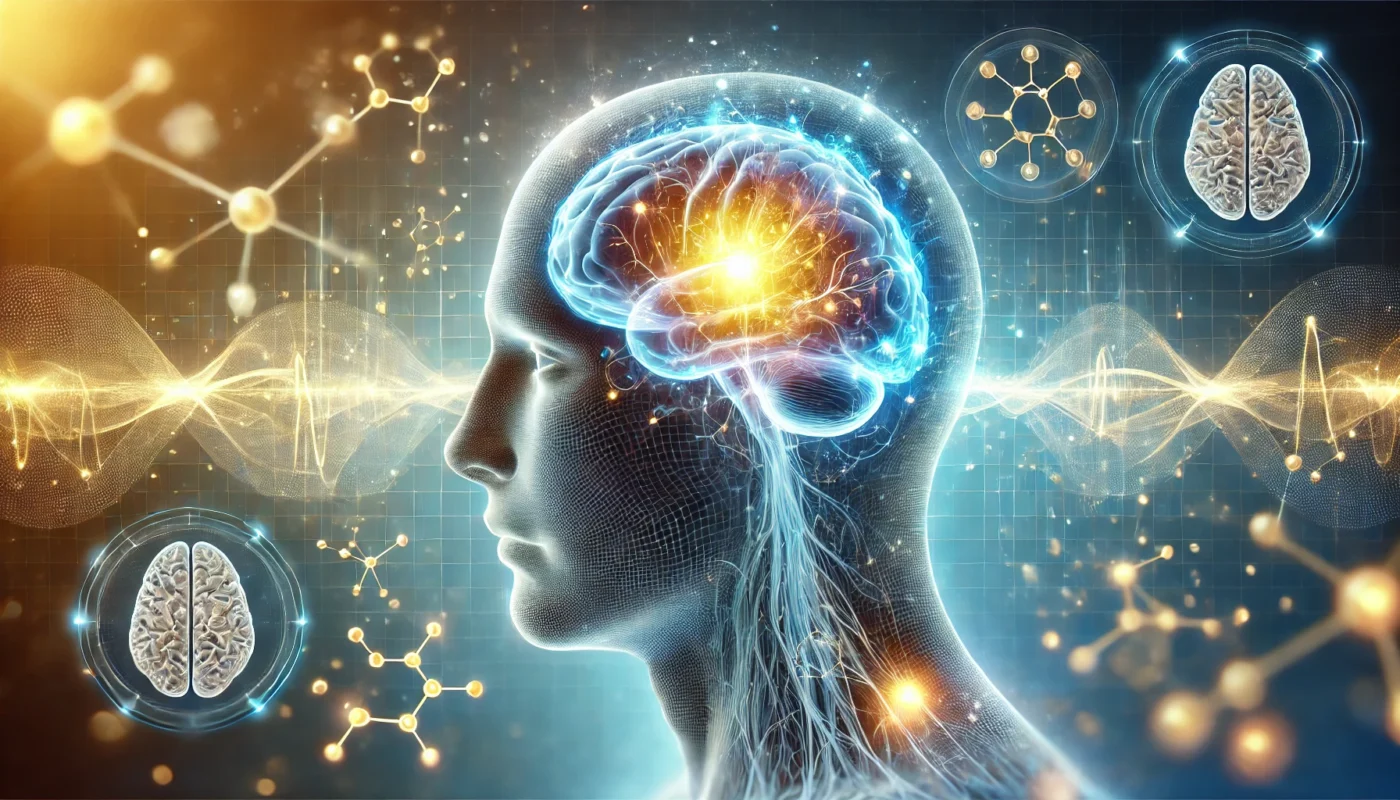Magnesium is a critical mineral for maintaining optimal brain function, yet it often goes overlooked in discussions of cognitive health. Among the various forms of magnesium supplements available, magnesium glycinate has emerged as a standout choice due to its superior bioavailability and calming properties. This chelated form of magnesium is bound to glycine, an amino acid that supports neurotransmitter activity, making it particularly effective for the brain. Recent research suggests that magnesium glycinate may enhance memory, support cognitive function, and potentially protect against neurodegenerative diseases. This article delves into the scientific evidence behind magnesium glycinate and its profound impact on brain health.
You May Also Like:
Magnesium Glycinate Supplement: A Comprehensive Guide to Long-Term Supplementation
Magnesium Glycinate and Holistic Healing for Chronic Stress
The Science of Magnesium Glycinate and its Impact on Brain Function is an original (HSLHealing) article.
The Brain’s Need for Magnesium
Magnesium is involved in over 300 biochemical reactions in the body, many of which are critical for brain health. It plays a key role in:
- Regulating neurotransmitters that influence mood, memory, and learning.
- Supporting synaptic plasticity, the brain’s ability to adapt and form new connections.
- Reducing oxidative stress and inflammation, both of which are linked to cognitive decline.
Despite its importance, studies indicate that up to 50% of Americans fail to meet their daily magnesium needs, which could have far-reaching consequences for brain function and overall health.
Why Magnesium Glycinate?
While magnesium can be found in many forms, not all are created equal. Magnesium glycinate is highly bioavailable, meaning it is easily absorbed by the body. Its chelation with glycine enhances its calming properties, making it particularly effective for addressing stress and promoting cognitive function. Research published in Magnesium Research (2019) found that magnesium glycinate outperformed other forms of magnesium in reducing symptoms of anxiety and promoting mental clarity, further solidifying its reputation as a superior option for brain health.ase mental clarity, further supporting the strong reputation of its quality for brain health.

Magnesium Glycinate and Neurotransmitter Regulation
1. Boosting GABA Activity
Glycine, the amino acid in magnesium glycinate, is a precursor to gamma-aminobutyric acid (GABA), a neurotransmitter that calms the brain. GABA’s inhibitory effects are critical for reducing anxiety, stress, and overexcitement in the nervous system.
A study published in Journal of Biomedical Science (2020) found that magnesium supplementation increased GABA receptor activity, leading to improved mood and cognitive focus. Magnesium glycinate, with its added glycine, may further amplify this effect, making it a valuable tool for reducing stress-induced cognitive impairments.
2. Regulating Serotonin and Dopamine Magnesium also influences serotonin and dopamine production, two neurotransmitters essential for mood regulation and executive function. Deficiencies in magnesium have been linked to depression, fatigue, and brain fog, all of which impair cognitive performance.

Magnesium Glycinate and Neurodegenerative Diseases
1. Alzheimer’s Disease
Alzheimer’s disease is characterized by the accumulation of amyloid plaques and neurofibrillary tangles, both of which contribute to neuronal damage and memory loss. Magnesium has been shown to reduce amyloid-beta aggregation and protect neuronal integrity.
A study in The Journal of Alzheimer’s Disease (2016) found that magnesium supplementation reduced amyloid plaque formation and improved cognitive function in animal models of Alzheimer’s. While human trials are limited, these findings highlight magnesium’s potential as a preventive strategy against neurodegenerative diseases.
2. Parkinson’s Disease
Parkinson’s disease is associated with the degeneration of dopamine-producing neurons. Magnesium’s antioxidant properties help combat oxidative stress, a major contributor to neuronal damage in Parkinson’s. Magnesium glycinate’s calming effects may also help alleviate non-motor symptoms of Parkinson’s, such as anxiety and sleep disturbances, which significantly impact quality of life.
Relieve Muscle Tension and Improve Brain Focus with Magnesium Glycinate—Buy Now on Amazon!

The Stress Connection: How Magnesium Glycinate Protects the Brain
Chronic stress is a major risk factor for cognitive decline. Prolonged exposure to stress hormones like cortisol damages the hippocampus, the brain region responsible for memory and learning.
Magnesium glycinate combats stress in several ways:
- Regulating the HPA Axis
The hypothalamic-pituitary-adrenal (HPA) axis controls the body’s stress response. Magnesium helps modulate this system, preventing excessive cortisol production. - Improving Sleep Quality
Magnesium glycinate’s glycine component promotes relaxation and deeper sleep. A study published in Sleep Medicine Reviews (2021) found that improved sleep quality directly correlated with enhanced cognitive performance and reduced stress levels. - Reducing Inflammation
Chronic stress often leads to inflammation, which accelerates neuronal damage. Magnesium’s anti-inflammatory properties protect against this damage, preserving cognitive function.
Boost Nervous System Health and Mental Clarity with Magnesium Glycinate—Order Now on Amazon!

Magnesium Glycinate Dosage and Safety
For individuals considering magnesium glycinate, appropriate dosing is essential. Typical recommendations are as follows:
- Adults: 200-400 mg of elemental magnesium per day, though specific needs may vary based on dietary intake and health conditions.
- Best Time to Take: Evening dosing is ideal for leveraging its calming effects and improving sleep quality.
Magnesium glycinate is generally well-tolerated, with fewer gastrointestinal side effects compared to other forms like magnesium citrate or oxide. However, excessive intake may cause loose stools or abdominal discomfort.
Integrating Magnesium Glycinate Into a Brain-Healthy Lifestyle
While magnesium glycinate offers significant benefits for cognitive health, its effects are maximized when combined with other brain-supportive strategies:
- Nutrition
- A diet rich in leafy greens, nuts, seeds, and whole grains provides a natural source of magnesium.
- Exercise
- Regular physical activity boosts brain-derived neurotrophic factor (BDNF), which supports neuroplasticity and complements magnesium’s effects.
- Mental Stimulation
- Engaging in activities that challenge the brain, such as puzzles or learning new skills, helps maintain cognitive sharpness.
- Stress Management
- Mindfulness practices, such as meditation and yoga, work synergistically with magnesium glycinate to reduce stress and enhance mental clarity.

Conclusion
Magnesium glycinate is a promising supplement for enhancing brain function, improving memory, and potentially protecting against neurodegenerative diseases. Its superior bioavailability and calming properties make it uniquely suited for cognitive health, particularly in individuals dealing with stress, sleep disturbances, or magnesium deficiencies.While magnesium glycinate is not a cure-all, it is a powerful tool when integrated into a holistic approach to brain health. Combining it with a nutrient-rich diet, regular exercise, and stress management can unlock its full potential, helping to preserve cognitive function and promote mental well-being throughout life.

References
- Magnesium and aging. Retrieved from: https://pubmed.ncbi.nlm.nih.gov/20388094/
- Magnesium in Aging, Health and Diseases. Retrieved from: https://www.mdpi.com/2072-6643/13/2/463
- Enhancement of Learning and Memory by Elevating Brain Magnesium. Retrieved from: https://www.sciencedirect.com/science/article/pii/S0896627309010447
- The Effects of Magnesium Supplementation on Subjective Anxiety and Stress-A Systematic Review. Retrieved from: https://pubmed.ncbi.nlm.nih.gov/28445426/
- Magnesium in the Central Nervous System. Retrieved from: https://www.ncbi.nlm.nih.gov/books/NBK507256/
Important Note: The information contained in this article is for general informational purposes only, and should not be construed as health or medical advice, nor is it intended to diagnose, prevent, treat, or cure any disease or health condition. Before embarking on any diet, fitness regimen, or program of nutritional supplementation, it is advisable to consult your healthcare professional in order to determine its safety and probable efficacy in terms of your individual state of health.
Regarding Nutritional Supplements Or Other Non-Prescription Health Products: If any nutritional supplements or other non-prescription health products are mentioned in the foregoing article, any claims or statements made about them have not been evaluated by the U.S. Food and Drug Administration, and such nutritional supplements or other health products are not intended to diagnose, treat, cure, or prevent any disease.

